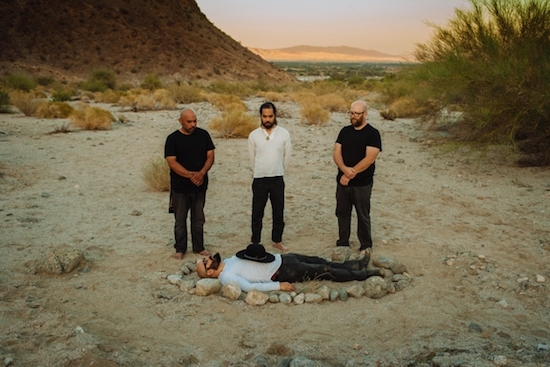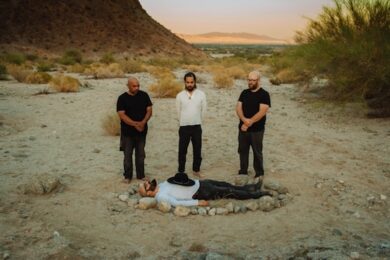What if Black Sabbath had played Afrobeat? What indeed. Bill Ward would have swung like the caveman jazzer he so righteously is; Geezer Butler could have held it down on the moustache alone; Iommi can do anything he wants. But: Ozzy in Lagos? The sun beats down like a wayward farrier on an anvil; the Guinness in Lagos is 8%; the weed is strong; the off duty coppers and dockers in the bars suffer no fools. It doesn’t bear thinking about, does it?
Here Lies Man have thought about it though – the aforementioned question is something of a mission statement for Marcos Garcia (alongside drummer Geoff Mann – son of jazzman Herbie Mann). Holding a lifelong love of hard groove, fuzz box delirium and life affirming percussive barrage, Garcia has spent the best part of 15 years with Brooklyn Afrobeat ensemble Antibalas. A rambling collective of serious chops, Antibalas have played with such luminaries as Tony Allen, Femi Kuti and Deli Sosimi and have toured their energetic show worldwide, blasting their joyous take on the sound with a ferocious vim while his solo project – Chico Mann – explored the connection between Afrobeat, jazz and hip hop.
On self-titled debut Here Lies Man, however, Garcia amps up the fuzz with a record that evokes the heat haze, weed blasted LA stoner rock slipstream, basing it not just around monolithic riffery but, crucially, the ‘clave’ rhythmic theory that underpins so much Afrobeat, Cuban jazz and Salsa – and arriving at a truly cooking conclusion.
The Quietus caught up with Marcos Garcia to talk telepathic musical connections.
What were you into as a kid?
Marcos Garcia: I was born into a musical family, so there were many influences. My father was a Latin record producer from the 1960’s-80’s and my mother was a DJ on Spanish language radio in NYC in the 1960’s and early 70’s; I was being influenced by all the music I heard on the radio growing up in the suburbs of New York City. Punk music resonated with me as a teenager.
What was the scene like at that point in NYC?
MG: Punk wasn’t all that popular among my peer group. I really liked Minor Threat, Dead Kennedys and The Exploited. You’d only hear it on the radio at certain times on a couple of college stations. New Wave was more popular and I liked that as well. My cousin introduced me to Bauhaus, and Joy Division. I loved the dark moodiness of those bands and the raw aggression of punk. That’s probably pretty typical of teenage boys growing up at the end of the Cold War era.
Also, I clearly remember hearing Soundgarden’s ‘Full On Kevin’s Mom’ when I was around 16 years old on one of those stations. It had a punk attitude but with more of a metal feel plus that wailing voice. They were really the band that provided the portal which opened me up to Sabbath and 70s metal/hard rock.
At the time, hair metal was the trend – and I was repelled by it.
The Afrobeat connection is writ large on Here Lies Man – the question ‘what would happen if Black Sabbath played Afrobeat?’ was used to describe the record: it’s a pretty darn good description. Can you expand on this?
MG: The thought occurred to me when I was recording the Antibalas album – Security – in 2005. I was learning the parts to a Fela Kuti song and it struck me: if you listen to Fela’s ‘Yellow Fever’ the tenor guitar part is both melodic and rhythmic. To me, Fela’s riff sounds like a clave based metal riff. I just imagined it with fuzz and being played with more abandon. The same thing applies to the main melody of the song. It’s super heavy. I knew at that point that I wanted to start a project that explored this connection.
I’ve always wanted to fully integrate all the sides of my musical personalities. In this project I get to indulge my love of diasporic rhythms, fuzzed out guitar textures, keyboard sound design and vocalising from the perspective of different characters telling a story albeit in short, repetitive phrases which unfold over the course of an album. It’s the first time I’ve had an avenue to put them all together. My musical journey has posed a lot of ‘what-if’ questions related to Afrobeat; it’s such a rich and inexhaustible style of music.
Antibalas is grounded in traditional afrobeat. Chico Mann imagines Afrobeat taking the place of funk in early hip hop and the myriad of electronic styles that came from that musical branch – Here Lies Man explores the rock & roll branch of that musical tree. There’s an on going musical conversation between Africa, Europe, and the Americas for the last five hundred years. Each continent influencing each other over and over. I’m just adding my two cents to that conversation.
Tell me about your first experience with the music.
MG: I first heard Fela the year he died, 1997. I was at a party in NYC and I could’ve sworn I’d heard this music before because it felt so familiar but I’m certain I hadn’t. Everything about it appealed to me, the complex syncopation, the modal jazz elements, the funk, the Yoruba/AfroCuban influence, it was all present and clear to me. I’d never heard all the elements of that musical conversation put together in that way before. At that time, I was getting heavy into American Jazz, AfroCuban Jazz, and traditional Yoruba music. Needless to say, Fela’s music spoke to me.
It wouldn’t be until years later that I really spent the time to study it but once I started, I was hooked. The first song that really drew me in utterly and completely was ‘Sorrow, Tears, And Blood’ The way Fela sang it, I could hear the anguish and the defiance. His delivery was absolutely punk to me. That song led me down a very long path I’m still treading.
Circular grooves, repetition, hypnotic power, acid fried madness – there is a lot of common ground between Afrobeat and music from the doom/stoner rock continuum. Would you say this is fair comment?
MG: Absolutely. The hypnotic power is what I enjoy the most. I always look forward to getting into that flow state with other musicians to play Afrobeat. What appeals to me about doom/stoner rock is the sense of abandon and catharsis mixed with angst and dread.
Can you describe the writing/recording process for the record?
MG: I wrote on the guitar and recorded the parts on my phone. I sent them to Geoff and we got together to play the songs and arrange them. It was a pretty efficient method and we worked easily together. I was subletting studio space from a friend in LA when I moved. The space used to be an old doctor’s office or something like that. The idea was to capture a proof of concept and not worry too much about making it sound pretty but – rather – to capture the rawness and newness of the material. The basic tracking felt like a DIY guerrilla operation. I had a tremendous sense of urgency and I wanted it to feel as though the speakers were being shredded when you listened to it. I really wanted to capture a sense of abandon. Those riffs had been around for a while and having the drum chair filled made me feel like there wasn’t any time to spare.
Overall, the process was pretty efficient. There was little second guessing of anything. We did two takes of each song, and picked the ones that felt the most compelling to us. I felt like the fourteen-year-old version of myself the whole time. I told Richi Panta while I was recording him that my goal was to slash and burn the speakers; drop a ferocious hammer on the listener. We laughed about it – but that was my way of channeling the spirit of my youth.
You worked with Geoff Mann – son of Herbie – on the record. He has some serious chops…what was the dynamic like?
MG: Geoff started playing drums with Antibalas around the same time I joined. He’s always been one of my favourite drummers to play with. When he plays, he’s engaging you in a musical conversation as opposed to playing some rhythms. It’s was really exciting to reconnect with him when I moved to LA; I felt like he was the missing piece of the puzzle and dynamically, we’re at the point where we can practically finish each other’s musical and verbal sentences. Because we’re working as production team day in and out, we’ve gotten to a place where often times we just know what musical decisions need to be made for most things we work on. It’s a pretty rewarding experience.
How did you link up with RidingEasy Records?
MG: After we finished recording the album, I called my friend, Andrew Mason (aka Monk One), to ask him if he had any recommendations for labels that might be interested. He happened to be friends with Daniel Hall of RidingEasy. The next morning Monk texted me back that RidingEasy was interested. When Daniel and I spoke, I couldn’t help but think how uncanny it was that the guy who made a Fela/Queen mashup in 2006 – which I really liked – now had a rock label. It made sense that he immediately got the connection when he’d heard our album.
Prior to connecting with RidingEasy, I’d told myself and Geoff that I was only interested in working with a label that really understood what we were doing and could really get behind it.
You’re based in LA – a city associated with glitz but with a seedy underbelly. Tell me about your experience of the city.
MG: Because every day is virtually the same weather-wise, the passage of time feels different here than in NY. It’s as if time is stretched out. It really appeals to my creativity in some sense. On the east coast the season punctuate the chapters of your life. LA doesn’t feel like that so I’ve found myself in a really consistent creative phase that’s lasted over a year and a half at this point. It also helps that Geoff and I started a production company called, The Brothers Mann, which keeps us working in the studio five days a week working on music.
What does the word psychedelia mean to you?
MG: I don’t think of psychedelia as having a meaning per se. It’s the natural state of the universe. When the mind stops perceiving the world/universe/things as binary/this vs. that – that is the state of psychedelia.
Do you have any plans touring this record?
MG: We’re really looking forward to taking the show on the road. We’re expecting to be on tour in the UK/EU this fall. We’ve had so many inquiries from the UK especially, it feels good to have people really connecting with the album. Seems that people there want dangerous music for dangerous times.



